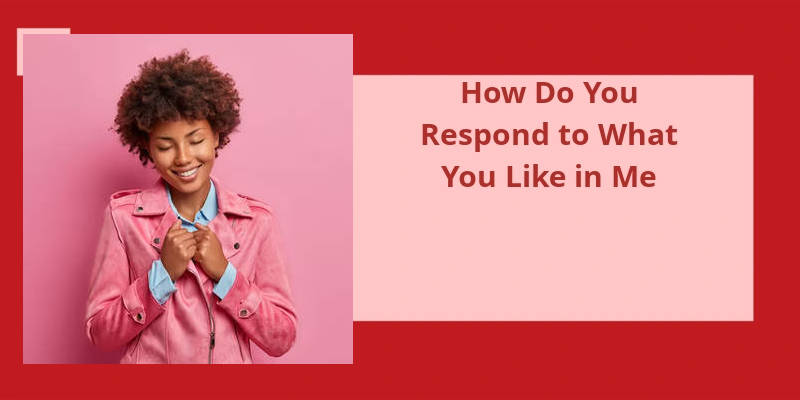It isn’t uncommon to find ourselves attracted to someone's qualities and characteristics that make them unique and special. Whether it’s the way they handle challenging situations with grace and composure, their kind-heartedness towards animals and the world around them, their unwavering passion for music, or their ability to be a loving and supportive sibling or child to their family, there are countless reasons why we may be drawn towards someone. When confronted with the question of how to respond to what we like in someone, it’s important to approach it with authenticity and appreciation. One possible approach is to express genuine admiration for the qualities that resonate with us, highlighting specific instances or experiences that have left a lasting impression. By doing so, not only are we showing our admiration and appreciation, but we’re also letting the other person know that we’ve taken the time to notice and acknowledge the aspects that make them special to us. Ultimately, responding to what we like in someone allows us to deepen our connection and understanding with them, fostering a stronger bond and potential for a meaningful relationship.
Is It Correct to Say How Do You Like?
When someone asks, “How do you like x?”, it’s often a way of gauging someones opinion or satisfaction with a particular item or experience. It allows the speaker to seek feedback or validation from the listener in a casual, conversational manner. The question is commonly used in situations where the speaker has provided or presented something to the listener, such as a gift, a meal, or a service.
For example, if youve just prepared a cup of coffee for someone, you could ask, “How do you like the coffee?”. This prompts the person to express their opinion on the taste, quality, or overall satisfaction they derive from the beverage they’re consuming. It allows the speaker to gauge whether the coffee meets the listeners expectations or preferences.
This question can also be used when presenting a gift or item to someone. For instance, if youve bought a new dress for your friend, you might ask, “How do you like the dress?”. This allows your friend to provide their initial impression or thoughts on the item, giving you an insight into their preferences or level of satisfaction.
It creates a comfortable space for them to share their thoughts openly and gives you an opportunity to cater to their needs or adjust accordingly, depending on their response. It’s a simple, yet effective way of fostering communication and understanding between individuals.
When someone asks, “How do you like it?”, they’re essentially asking for your overall opinion or impression of something. This question is often used in a casual and informal context, giving the conversation a more relaxed tone. Instead of directly asking whether you like something or not, this phrase allows for a broader response, encouraging a more detailed and nuanced answer. So, next time someone asks you this question, feel free to share your thoughts in a thoughtful and open manner.
What Does It Mean When Someone Says How Do You Like It?
When someone says, “How do you like it?” they’re essentially asking for your general opinion or evaluation of something. This type of question is commonly used when seeking feedback or gauging someones reaction to a specific item, event, or experience. It signifies a more laid-back approach compared to simply asking, “Do you like it?” as it creates a conversational tone that encourages a comprehensive response.
It enables them to comprehend the various aspects and intricacies of your preferences, opinions, and tastes. By posing this question, they hope to gather insights on your overall satisfaction, enjoyment, or lack thereof, allowing for a more comprehensive understanding of your perspective.
It conveys an understanding that people have their own unique preferences and experiences, and there’s value in diverse opinions and perspectives. This question fosters a welcoming atmosphere for genuine discussion and encourages individuals to express their thoughts openly.
They want to understand your general opinion, evaluation, and overall impression regarding a particular subject. By using this phrasing, they aim to promote meaningful conversations, gather diverse perspectives, and demonstrate their openness to different viewpoints. So, next time someone poses this question to you, feel free to share your thoughts and engage in a thoughtful exchange.
When someone asks you, “How do you like ___?” it’s important to provide a thoughtful response that captures your true feelings and experiences. While a simple “It’s great!” may suffice in some situations, being genuine and offering more insight can help foster a better conversation. However, it’s crucial to distinguish “How do you like ___?” from “What’s ___ like?” as they’re separate inquiries with distinct expectations.
How Do You Respond to How Do You Like?
When someone asks about your thoughts on something and uses the phrase “How do you like,” it’s important to provide an honest and thoughtful response. Instead of just giving a simple “It’s great!” answer, take the time to express your specific feelings and experiences related to the topic in question. For example, if someone asks you, “How do you like the new restaurant?” you can respond by saying, “I really enjoy the ambiance and the variety of dishes on the menu. The staff is friendly, and the food is consistently delicious. However, I do find the portion sizes to be a bit large for my liking.”
It’s crucial to remember that when someone asks “How do you like ___?”, they’re seeking your personal opinion or evaluation of the subject. This question prompts you to express your preferences, experiences, and overall satisfaction or dissatisfaction with the topic at hand. Whether it’s a book, a film, a vacation destination, or any other subject, your response should provide specific details and insights into your level of enjoyment or appreciation.
On the other hand, “What’s ___ like?” is a different question and invites a more descriptive response. This question requires you to provide an overall portrayal or impression of the subject in question. For instance, if someone asks, “What’s the new movie like?” you’d offer a broader overview of the films genre, plot, characters, and any standout elements that make it unique or memorable. Your answer wouldn’t be limited to personal opinion but rather an informative depiction of the subject.
Both “How do you like ___?” and “What’s ___ like?” prompt you to provide information or opinions, but the former focuses on your personal evaluation, while the latter invites a more objective description. Understanding the nuances between these questions can help you tailor your responses accordingly, ensuring effective and appropriate communication.
When someone asks the common question, “How are you?”, there’s a multitude of ways to respond. Some may opt for the straightforward and seemingly automatic, “I’m fine, thanks. How about you?” Others may lean towards simplicity with responses like, “Good, thanks. And you?” Additionally, there are those who offer a brief yet slightly different answer, such as “I’m good. And yourself?” And of course, there are those who express a moderate response, “Not bad.” These are just a few examples of how one might react to the ever-present inquiry.
How Do You Respond to How Are You?
When someone asks you, “How are you?” it’s a common social convention to respond with a similar inquiry. For instance, you might say, “Im fine, thanks. How about you?”. This exchange is an opportunity to engage in a polite and brief conversation, showing interest in the other persons well-being. Another possible response could be, “Good, thanks. And you?”. This reinforces the positive tone of the initial question and expresses a desire for reciprocity.
If you’re in a hurry or prefer to keep the interaction brief, a simple “Im good” might suffice. However, to acknowledge the other persons interest, you could supplement your response with, “And yourself?”. By doing so, you demonstrate your awareness of the social norms and your willingness to participate in conversation, even if in a limited way. Alternatively, you could say, “Not bad,” indicating that you’re neither exceptionally good nor bad, allowing for the possibility of further exchange if desired.
Some individuals may prefer more in-depth conversations, using the question as an opportunity to share their genuine feelings and experiences. Others may stick to the traditional formulaic responses, acknowledging the pleasantries and moving on swiftly. Tailoring your response to the situation and taking into account the other persons expectations will help create a more harmonious and enjoyable exchange.
Conclusion
In conclusion, it’s truly special when someone acknowledges and appreciates the unique qualities that they admire in another person. Acknowledge their strengths and the positive impact they’ve on your life. Express your admiration and appreciation for their qualities, whether it's their composure during difficult times, their loving and caring nature towards animals, their passion for music, or their exemplary role as a sibling and child. Responding with sincerity and specificity shows that you genuinely recognize and value their individuality. Embrace the opportunity to uplift and affirm the qualities you admire in others, as it fosters deeper connections and strengthens relationships.






